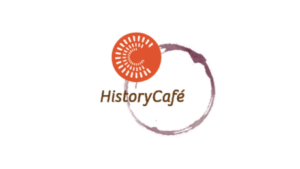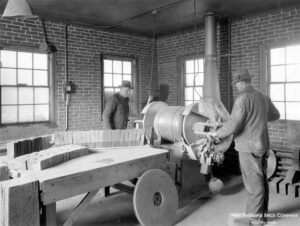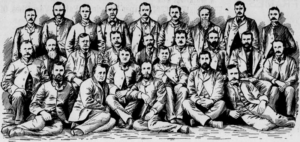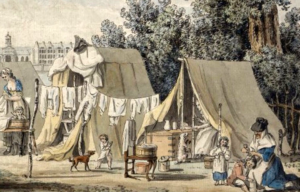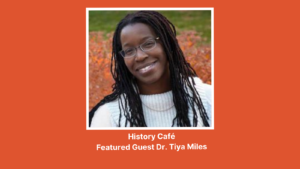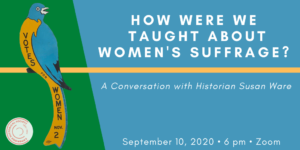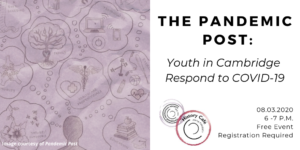Posts Tagged ‘History Café’
July 28 History Café Recap: Changing Tides in Cambridge Industry
What did the industrial landscape of the city look like in the 19th and 20th centuries, and what sectors are prominent today? How have waves of migration—both domestic and international—shaped the demographic makeup of Cambridge’s industrial labor force? What struggles have workers faced in the city’s largest industries, and how have they organized and advocated for themselves? What roles have race and gender played in the dynamics of Cambridge industry?
Read More‘Changing Tides in Cambridge Industry’ talk will examine wave of labor and immigration
Since its beginnings as a colonial settlement, Cambridge has seen numerous shifts in its population, as waves of migrants arrived from various parts of the United States and around the world. As these new Cantabrigians arrived in the city needing work, many found jobs in the city’s industrial sector, most notably in the glass, brick, furniture, meatpacking and confectionary factories in Cambridge. Employment in many of these industries was dominated by different immigrant groups at different periods, with newer arrivals taking jobs in lower-paying, more physically demanding sectors. Eventually these ethnic groups would move up the socioeconomic ladder, finding employment in more lucrative and less strenuous industries while the next wave of newcomers replaced them. For many, similar work experience at home and the recommendation of friends, family or others of their same ethnicity led them to choose a particular industry. For others, their status as immigrants drastically limited the employment options open to them. Whether by choice or circumscription, the clustering of migrant groups in particular industries helped shape the labor landscape of Cambridge.
Read MoreJune 23 History Café Recap: The Work of Revolution
How did unpaid labor enable the Revolutionary leaders of Cambridge to foment rebellion and to carry out the political and military duties of the War? Although much is known about George Washington’s residency in Cambridge in the early days of the Revolution, the reality is that it was the labor of women and people of…
Read MoreGilded Age Cambridge eyed the Haymarket Affair as misconduct from ‘those Bohemian anarchists’
How labor won over suspicion resulting from violence in Chicago
Read MoreUpcoming History Cafe will pose the question: Washington slept here, but who made his bed?
A talk on women, Black Cantabrigians and the work of revolution
Read MoreFeb 3 – History Café: Local History and the Black Experience in Slavery and Freedom
How do we bring the stories of both enslaved and free Black residents to the forefront of local history, and what can one city’s experiences teach Cantabrigians about uncovering these stories within our own communities? In our quest to do “history without borders,” we will be speaking with Dr. Barbara Brown of Hidden Brookline, an…
Read MoreHistory Café Recap: Pandemic Roadshow
As 2021 and our year of asking “How Does Cambridge Mend?” came to a close, we invited you to think about the objects that have symbolized the pandemic experience for you, your family and your community. On December 16 we gathered via Zoom to share objects and discuss the importance of tangible symbols of the…
Read MoreHistory Café: Harriet Jacobs and the World of Abolitionist Cambridge Women
Harriet Jacobs is best known for her autobiography, Incidents in the Life of a Slave Girl, in which she chronicles her enslavement in North Carolina, her subsequent period in hiding in a tiny attic garret, and her eventual escape north to freedom. But Jacobs was also for many years a resident of Cambridge, where she ran…
Read MoreHow Were We Taught About Women’s Suffrage? A Conversation with Historian Susan Ware
During this important centennial year we have had many opportunities to learn about the decades-long movement for women’s suffrage that culminated in the passage of the 19th Amendment in 1920. But how has our understanding of this complex and multilayered history been shaped by what we were taught in school? When, and in what ways,…
Read MoreThe Pandemic Post: Youth in Cambridge Respond to COVID-19
Over the last several months, the COVID-19 pandemic has turned all our worlds upside down. But what has this upheaval looked like for young people in Cambridge? This spring, students at the Cambridge Rindge and Latin School created The Pandemic Post, an online newsletter in which they reflected on their experiences through art, poetry and prose.…
Read More
